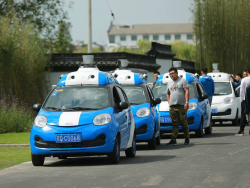— Auto safety organization, Consumer Watchdog, says self-driving car companies are taking advantage of the government's hands-off approach to matters of safety by failing to provide reports about the safety of the technology.
Since the National Highway Traffic Safety Administration (NHTSA) created its 12-point safety "voluntary guidelines" for autonomous companies, only Waymo (Google) has published a safety report. And even with that, Consumer Watchdog says Waymo's report reads more like a marketing brochure than a detailed safety report of self-driving car technology.
Instead of doing its job by creating and enforcing safety regulations that must be met by driverless car companies, NHTSA is allowing manufacturers to provide safety reports when they feel like doing it.
Consumer Watchdog says this has made public highways nothing more than laboratories where humans are guinea pigs, proof that NHTSA's voluntary guidelines don't work.
When a company doesn't publish details about its autonomous technology because it doesn't have to, the public is left in the dark about what is taking place on local roads and highways.
Consumer Watchdog says if it wasn't for California, the driving public would know absolutely nothing about how self-driving technology is working.
Driverless car companies in California require permits from the Department of Motor Vehicles and crash reports must be filed within 10 days of an incident. Additionally, yearly "disengagement reports" must be provided that explains when the autonomous technology failed.
Compared to a few years ago, the number of companies that must submit disengagement reports is much higher.
Seven companies were approved for testing of driverless cars in 2014, which required those companies to file disengagement reports with the California DMV by January 1, 2016. However, today there are 19 companies that are required to provide reports. The DMV says it expects to release those reports in January 2018.
Previous data supplied by autonomous companies indicates why human drivers are monitoring the skills of the computerized cars. For example, Mercedes-Benz drivers had to take control of the driverless cars 1,051 times out of 1,739 miles driven.

